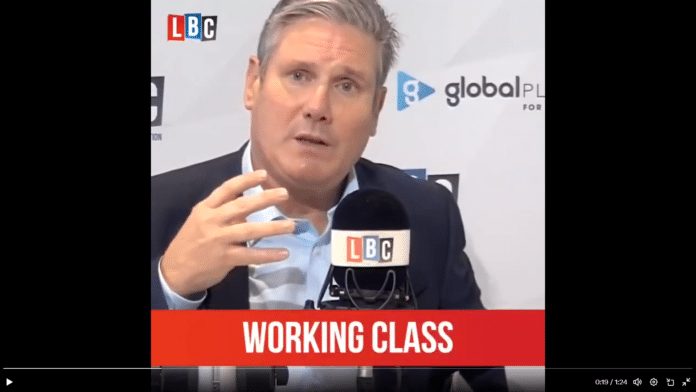One would expect the leader of the Labour Party to know this, but alas….
Working Class described by Keir ???? pic.twitter.com/Em45mTjYK1
— ⚒ on ???? (@Hammer_On_X) December 15, 2023
Keir Starmer could not tell the difference between the working classes and the middle classes, so let us teach him.
The distinction between the working class and the middle class is often based on various factors like income, occupation, education, lifestyle, and social standing. Here’s a breakdown:
The Working Class:
- Occupation: Members of the working class are typically employed in manual or blue-collar jobs that require physical labour or routine tasks. This includes jobs like factory workers, labourers, service industry workers, etc.
- Income: They usually earn wages rather than salaries and might have a lower income compared to the middle class.
- Education: Formal education levels might vary, but higher education qualifications are less common.
- Lifestyle: Living standards can be modest, and financial stability might be more precarious. They often live paycheck to paycheck and might face challenges in terms of savings and investments.
- Social Standing: Historically, the working class has been associated with less social and economic power, although this has evolved over time.
The Middle Class:
- Occupation: Middle-class individuals often hold white-collar jobs that require specialised skills, education, or managerial positions. This includes professions like teachers, nurses, accountants, managers, etc.
- Income: They typically have a more stable income, earning salaries rather than hourly wages, which tend to be higher than the working class but may not be as substantial as the upper class.
- Education: They often have higher levels of education, including university degrees or postgraduate qualifications.
- Lifestyle: Middle-class families tend to have a more comfortable lifestyle with greater access to resources, including better housing, education, healthcare, and savings.
- Social Standing: The middle class historically represents a significant segment of society, enjoying a moderate level of social and economic influence.
Two of the most important theorists involved in defining social class are Karl Marx and Max Weber, both prominent figures in sociology and economics. They held distinct perspectives on social class and its role in society. While sharing some common ground, their views diverged significantly in terms of the factors shaping social stratification and the nature of class dynamics.
Karl Marx, a revolutionary thinker, believed that social class was primarily determined by one’s relationship to the means of production. He identified two primary classes in capitalist societies:
- Bourgeoisie (Capitalists): This class owned the means of production—factories, land, and resources—and derived profit from the labour of the working class.
- Proletariat (Working Class): The proletariat comprised the labourers who sold their labour for wages but did not own the means of production. Marx argued that they were exploited by the bourgeoisie, leading to inherent conflict between the two classes.
Marx envisioned a society moving towards a classless state, where the means of production were collectively owned, eliminating the class struggle and establishing communism.
Max Weber, on the other hand, acknowledged the significance of economic factors but expanded the understanding of social stratification beyond just class. He introduced a multidimensional approach to social hierarchy, including:
- Class: Weber agreed with Marx that economic factors played a crucial role in shaping social class. However, he believed that additional factors like market situation, skill, and status also influenced one’s position in society.
- Status: Weber emphasised social status as a determinant of class, considering factors like prestige, honour, and social standing in addition to economic conditions. He argued that individuals could belong to different classes but share a similar social status.
- Power: Weber highlighted the role of power in shaping social relations. He identified that power could come from various sources, not solely from economic ownership but also from political influence, bureaucratic authority, or social connections.
Unlike Marx, Weber did not foresee the elimination of social classes but instead viewed them as complex and multifaceted, driven by multiple factors interacting in society.
I would like to think that this relatively basic understanding of social class dynamics would be at the forefront of the consciousness of Keir Starmer and his front bench. Alas, I suspect that, like the Tories they parrot, I am quite wrong.
Jason Cridland
If you would like your interests… published, submit via https://dorseteye.com/submit-a-report/
Join us in helping to bring reality and decency back by SUBSCRIBING to our Youtube channel: https://www.youtube.com/channel/UCQ1Ll1ylCg8U19AhNl-NoTg SUPPORTING US where you can: Award Winning Independent Citizen Media Needs Your Help. PLEASE SUPPORT US FOR JUST £2 A MONTH https://dorseteye.com/donate/







